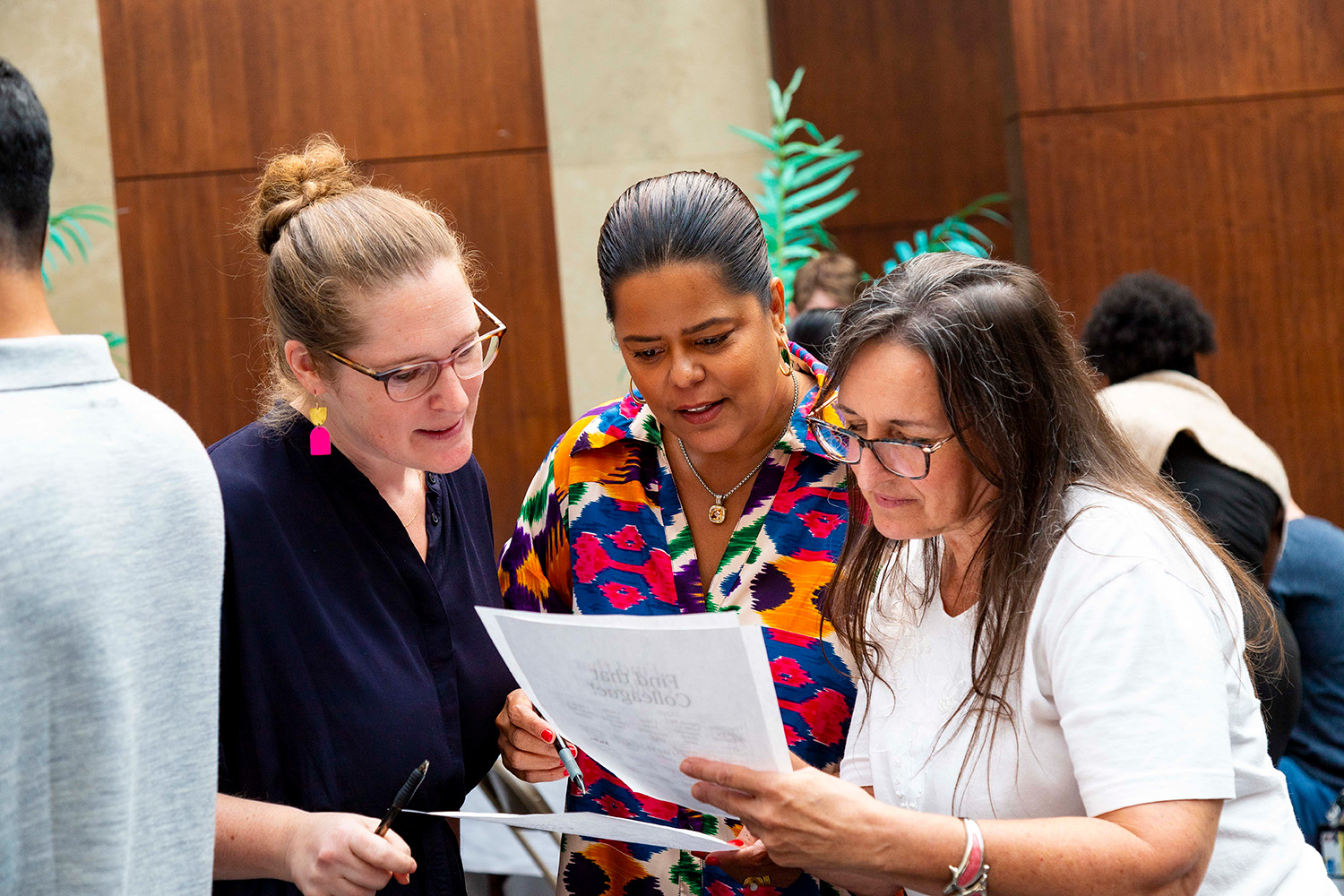About
For over 25 years, the Diversity Institute has conducted action-oriented research, worked with organizations across sectors and coordinated innovative programs to strengthen Canada’s competitiveness, sustainability and self-sufficiency. By tracking technological, economic, demographic and geopolitical trends, DI anticipates changes in employment and the implications for the policies, programs and processes.
Our evidence-based approach advances knowledge of the complex barriers faced by equity-deserving groups, leading to practical solutions that effect change and advance a strong, inclusive Canadian economy.
The Diversity Institute is part of the consortium — Toronto Metropolitan University, Conference Board of Canada (external link) and Blueprint (external link) — that created the Government of Canada-funded Future Skills Centre (external link) (FSC).
We also lead large national projects, including the Women Entrepreneurship Knowledge Hub (WEKH) (external link) , the Inclusive Innovation and Entrepreneurship Network (IIE-NET) (external link) , DiversityLeads and the Advanced Digital and Professional Training (ADaPT) and ADaPT for Black Youth programs, among others. We are a partner in the Bridging Divides program which focuses on immigration and the Artificial Intelligence and Quality of Working Lives and Worker Well-Being (PAIQ) research program led by the University of Toronto (external link) , among others.
Using tools like our Diversity Assessment Tool (DAT) (external link) , we provide consulting services to organizations across sectors to advance equity, diversity and inclusion (EDI), assess their progress and implement actionable strategies for lasting change. Our training programs—including Skills Bridge (external link) , ADaPT, Newcomer Employment & Entrepreneurship Skills Hub (NEESH) (external link) and Women’s Entrepreneurship Hub (WE-Hub)—equip teams with the skills, networks and insights needed to build more inclusive, innovative and future-ready workplaces.
.jpg)
In 1999 Dr. Wendy Cukier, a professor and award-winning researcher at Toronto Metropolitan University’s Ted Rogers School of Management, launched the Diversity Institute to advance understanding of diversity and inclusion through the lens of employment, innovation and skills. With emerging trends like the growth of immigration in Canada, reports of soft and hard skills gaps, the introduction of disruptive technology, and more women and under-represented groups in the workforce, the Diversity Institute applies a technology and innovation approach to advancing understanding of and solutions to these issues.
Canada’s competitiveness in a rapidly evolving global market relies on the skill of our workforce and its ability to leverage the skills of a diverse workforce. There is competitive advantage to be found in fostering innovative solutions which address the needs of persistently underrepresented groups, including women, youth, newcomers, racialized minorities, persons with disabilities, veterans, and people from Indigenous, rural, remote and northern communities.
In partnership with Toronto Metropolitan University, the Diversity Institute seeks opportunities to gain a deep knowledge of economic and technology trends, gender and diversity analysis through rigorous mixed methods of research and evaluation, coupled with skills training-from essential skills through to advanced technology skills.
In more than 25 years of existence the Diversity Institute has made a real impact and had concrete results, including groundbreaking research, innovative programming to address emerging challenges in real time, and policy advocacy to effect legislative change. Our DiversityLeads project, which tracked and benchmarked diversity in boards and senior leadership across sectors over a five-year period broke new ground in creating the first Canadian data set of its kind and establishing a methodology now considered best practice. The DiversityLeads findings underpinned the Diversity Institute's successful advocacy to the federal government in consideration of corporate diversity reporting requirements in (PDF file) Bill C-25. Collaborating with a range of corporate, government, and community partners, the DI creates and delivers innovative work-integrated learning and entrepreneurship programs designed to address skills gaps among diverse groups, including ADaPT, the Newcomer Entrepreneurship Hub (external link) , and many new initiatives on the way.
Since its establishment, the DI has successfully sustained and grown its research portfolio through external sources of funding in addition to internal funding for administrative costs. In 2017 alone, it attracted new funding totaling $8,195,387, plus extensive cash and in-kind commitments from partners. We have also grown our network of partners and collaborators to more than 150 partners across 15 countries, including the OECD, UNHCR, UN Global Compact, as well as leading private sector companies RBC, Morneau Shepell, TD Bank, Deloitte Ltd., Scotiabank, Accenture and Microsoft CanadaInfographics.


The Diversity Institute uses an ecological systems approach to understand diversity and inclusion at the societal, organizational and individual levels. We also leverage technological and social innovation to address both long-standing and emerging societal challenges. We deploy policy and media analysis to examine nuanced aspects of workforce integration, and undertake advocacy to government for evidence-based public policy measures based on our research.
Using an ecological model of change, the Diversity Institute is driving innovation across sectors. Workplaces do not operate in a vacuum: broad social and cultural factors influence external perceptions of an organization and have a profound impact on procuring the talent necessary to succeed.
The ecological model provides a framework for organizations to consider the complex interactions and barriers among individual, organizational and societal factors. A thorough understanding of the linkages between the societal, organizational and individual levels ensures that organizations support practices that positively shape systemic processes.
Diversity Institute is a strong proponent of action-oriented research, and developing collaborative, innovative solutions to societal challenges. Identifying and working with partners on evidence-based solutions helps to expand the body of knowledge related to workforce trends, promote inclusive career development processes, and improve access to high quality training. We are always looking for opportunities to collaborate with dynamic organizations across sectors, and in particular those with interest in:
- Bridging existing skills gaps & preparing for the future of work
- Breaking down barriers to employment and entrepreneurship for underrepresented groups
- Driving inclusive innovation across the workforce
- Leveraging technology and social innovation to drive inclusion
- Developing strategies to promote diversity in leadership

The team

Our partners
